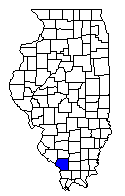
GEORGE BOLLINGER, one of the prominent citizens of Randolph County, was born near Ellis Grove February 6, 1856, and is the eldest child of Daniel and Mary (Leavitt) Bollinger. His father was born neat Nashville, Tenn., where he lived until eighteen years of age, when he came with his father, Jacob Bollinger, to Randolph County, Ill. The latter here followed farming and distilling until his death, and Daniel carried on agricultural pursuits throughout his life. He passed away in 1866, and his wife was called to her final rest in 1849.
In the common schools George Bollinger was educated, and upon the home farm was reared. At the age of twenty-three he began earning his own livelihood, and throughout life has been a farmer. He is now the owner of one of the finest farms of Randolph County, highly cultivated and improved, and complete in its appointments. It is neat and thrifty in appearance and indicates to the passer-by the careful supervisor of the owner.
In March, 1862, Mr. Bollinger married Miss Harriet C., daughter of Dwight Hunt, a native of Connecticut, who came to Illinois and married Miss Hughes, of Randolph County. To our subject and his wife were born seven children, but Ada and Barnes died in childhood. Those living are, Henry E.; Mary, wife of P. H. Mullholland, who is living near Portland, Oregon; Ida, wife of Daniel Ningler, who resides near Ellis Grove; Maud and George D., who are at home with their father. The mother died June 25, 1878, and Mr. Bollinger was married November 25, 1879, to Mrs. Nancy J. Harmen. She was married May 2, 1873, to Andrew Harmen, with whom she lived three years. They had two children, Carrie and Ida R., who are with their mother. Mr. and Mrs. Bollinger have one son, Joseph.
Our subject is a member of the Masonic fraternity, and his wife belongs to the Baptist Church.
In politics he is a Republican, but has never been an office seeker, although he has been officially connected with the schools for a number of years. He is a prosperous citizen, and his success in life has been acquired through his own efforts.
Mrs. Bollinger is the daughter of Thomas McDonald, whose father, Felix McDonald, came from South Carolina to Randolph County in an early day. The former married Mary J., daughter of John Thompson, who was elected to the Legislature from this district in 1834. In his canvass he made the following speech:
"Fellow-citizens: I come before you as a candidate for your suffrages, to represent your counties in the next General Assembly of Illinois. It is due you that I should declare my opinions concerning some leading questions that now are, and will continue to be for some time, the subject of legislation. I shall freely express my sentiments, cherishing a hope that they will meet your approbation. I have been a citizen of Randolph County from early youth, and have endeavored to support the principles of the Democratic school, believing them to be in strict accordance with the spirit and genius of our free institutions. That liberty and learning lean upon each other for support is a truth which has long been acknowledged by the intelligent and liberal thinking people of all countries, and of which we are all becoming convinced by experience and observation. It is not in the nature of things that a popular Government can long exist except among an enlightened and virtuous people. Every effort, therefore, to encourage education deserves the zealous support of every genuine friend of liberty. Nothing else can shield them against the designs of intriguing politicians, who always come in the name and garb of patriotism, and calling themselves friends of the people, cheat them to their ruin. As it respects the election of a Senator to Congress, I am willing to express ray partiality as soon as the candidates are fairly in the field, and shall embrace this earliest opportunity of satisfying the voters of the district on that point. In this case, the vote not coming directly from the people, I will, if elected, consider myself bound to be ruled by instruction. The removal of the county seat of Randolph County is a question that has arisen among it^ citizens. Satisfied as I am that sectional prejudices are allayed as to making it a question to operate on the ensuing election, and believing also that the removal should never be asked until the majority of the citizens of the county by petition or otherwise should make the application, individually I am in favor of the measure, but if elected, should never be heard to advocate the removal until a clear and decided majority of the county should prefer it. A railway or canal to effect a direct communication between Lake Michigan and the Illinois River is a subject of great importance to this and the neighboring states, and should be encouraged so far as the means of our state and aid from the general Government would justify. These and other measures that we are all conversant with will meet my ardent approbation. I do not approve of the present principle upon which the school fund is applied, or of establishing another state bank without a special capital. I feel satisfied that the citizens of our counties are convinced and generally united on this point. And now, fellow-citizens, I submit myself to the ballot box, feeling at the same time that you will give me a strong and honorable support, and yielding, if not elected, without a murmur. "John Morrison."
He was elected and removed to Vandalia, then the capital, where shortly afterward he died and was buried.
Extracted from Portrait and Biographical Record of Randolph, Jackson, Perry and Monroe Counties, Illinois, published in 1894, page 415.
Randolph |
Perry | Franklin |
Perry MO |
 |
Williamson |
| Union |


